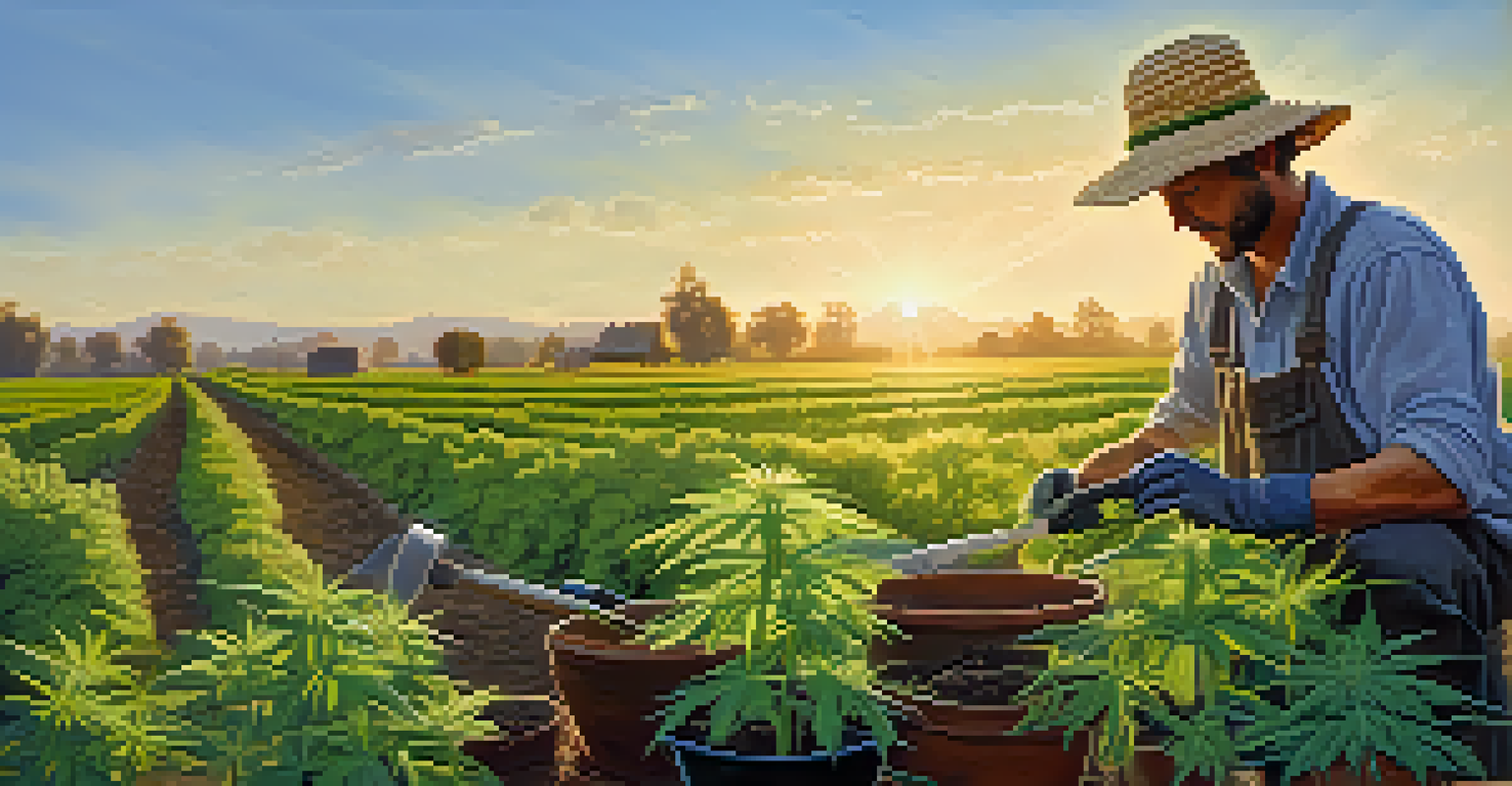How Organic Farming Enhances Sustainability in Marijuana Cultivation

Understanding Organic Farming in Marijuana Cultivation
Organic farming is all about working with nature rather than against it. In the context of marijuana, this means cultivating cannabis without synthetic fertilizers, pesticides, or herbicides. Instead, organic growers utilize natural compost, beneficial insects, and crop rotation to maintain healthy plants and soil.
The greatest threat to our planet is the belief that someone else will save it.
The essence of organic farming lies in its holistic approach, focusing on the entire ecosystem. By fostering a diverse environment, organic methods not only enhance plant health but also promote biodiversity. This balance is crucial in marijuana cultivation, where healthy plants can better resist pests and diseases.
Moreover, organic practices often lead to a superior product. Many consumers prefer organic marijuana for its purity and quality, believing it offers a more authentic experience. This preference supports the idea that sustainable practices can align with market demand.
Environmental Benefits of Organic Marijuana Farming
One of the most significant advantages of organic farming is its positive impact on the environment. By avoiding synthetic chemicals, organic marijuana cultivation reduces soil and water pollution. This practice not only protects local ecosystems but also helps maintain clean waterways for future generations.

Additionally, organic farming promotes soil health through practices like composting and cover cropping. Healthy soil is a carbon sink, meaning it can sequester carbon dioxide from the atmosphere, contributing to climate change mitigation. This relationship underscores the importance of sustainable methods in the fight against environmental degradation.
Benefits of Organic Farming
Organic marijuana cultivation enhances plant health, promotes biodiversity, and often results in a superior product preferred by consumers.
Furthermore, organic farms tend to use less water and energy than conventional farms. By employing techniques like rainwater harvesting and solar energy, organic growers can operate more sustainably, reducing their carbon footprint. This efficiency adds another layer to the argument for organic marijuana cultivation.
Economic Advantages of Organic Marijuana Practices
While transitioning to organic farming can require an initial investment, the long-term economic benefits are substantial. Organic marijuana often commands higher prices in the market, attracting consumers willing to pay more for quality and sustainability. This premium can significantly boost growers' profits.
Sustainability is about ecology, economy, and equity.
Moreover, organic practices can lead to reduced costs over time. By relying on natural pest control and fertilization methods, farmers can decrease their dependency on expensive synthetic inputs. This shift not only cuts costs but also protects farmers from the volatility of chemical prices.
Finally, organic certification can open new markets for marijuana cultivators. As the demand for organic products continues to rise, growers who adopt these practices can tap into lucrative markets that prioritize sustainable and ethical sourcing. This shift not only benefits individual farmers but also promotes a more sustainable industry overall.
Social Impact of Organic Marijuana Cultivation
Organic farming fosters a sense of community and social responsibility among growers. Many organic marijuana cultivators prioritize local engagement, often sourcing materials and labor from nearby communities. This practice strengthens local economies and creates job opportunities.
Additionally, organic marijuana farms tend to focus on transparency and ethical practices. By prioritizing organic methods, growers are often more connected to the land and more aware of their environmental impact. This connection promotes a culture of sustainability and responsibility within the industry.
Environmental Impact Matters
By avoiding synthetic chemicals, organic marijuana farming reduces pollution and promotes soil health, contributing to a sustainable ecosystem.
Furthermore, organic cultivators often engage in educational initiatives, sharing knowledge about sustainable practices with other farmers and consumers. This communal learning helps spread awareness about the benefits of organic farming, fostering a more informed and conscientious community.
Challenges Facing Organic Marijuana Cultivation
Despite its many benefits, organic marijuana farming does come with challenges. One significant issue is the potential for lower yields compared to conventional farming. Organic growers must be patient and strategic, often investing more time and effort into achieving optimal results.
Pest management can also be a struggle. Without synthetic pesticides, organic farmers need to employ alternative strategies, such as integrated pest management (IPM). This method requires careful monitoring and proactive measures, which can be labor-intensive and require a deeper understanding of ecological relationships.
Lastly, the certification process for organic marijuana can be daunting. Navigating regulations and demonstrating compliance can be time-consuming and complex. However, many cultivators believe the benefits far outweigh the challenges, as organic certification can enhance marketability and consumer trust.
Future Trends in Organic Marijuana Farming
As the demand for sustainable products continues to grow, the organic marijuana sector is likely to see significant advancements. Innovations in organic farming technologies, such as precision agriculture, can enhance efficiency and yields while adhering to organic standards. This evolution will help bridge the gap between sustainability and productivity.
Moreover, increased awareness and education about the benefits of organic practices will likely drive more farmers to consider organic methods. As consumers become more discerning about their choices, the push for transparency and sustainability will shape the future of marijuana cultivation.
Economic Gains for Growers
Although transitioning to organic practices may require an upfront investment, it can lead to higher market prices and reduced costs in the long run.
Finally, collaborations between growers, researchers, and policymakers can further promote organic practices. By investing in research and development, the marijuana industry can find new ways to enhance sustainability while meeting market demands, creating a win-win scenario for all involved.
How Consumers Can Support Organic Marijuana Farming
Consumers play a pivotal role in promoting sustainable practices in marijuana cultivation. By choosing organic products, buyers signal to growers that there is a demand for sustainably sourced marijuana. This shift encourages more farmers to adopt organic methods, contributing to a healthier environment.
Additionally, supporting local organic farms helps strengthen community ties and fosters economic growth. When consumers prioritize local products, they not only get fresher, higher-quality marijuana but also invest in their local economy, creating a cycle of sustainability.

Finally, educating oneself about sustainable practices and advocating for transparency in the industry can amplify consumer impact. By engaging in conversations about organic marijuana and sharing knowledge, consumers can help raise awareness and drive positive change in cultivation practices.